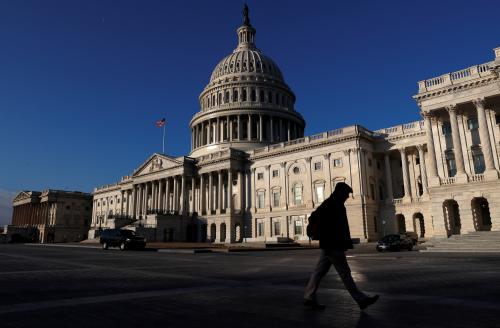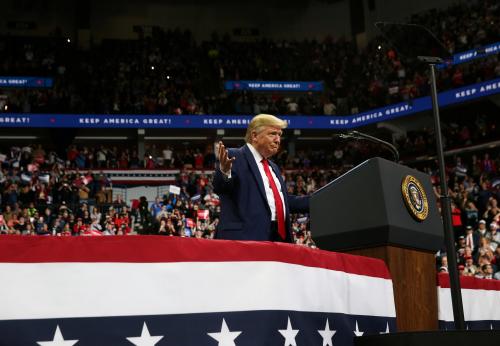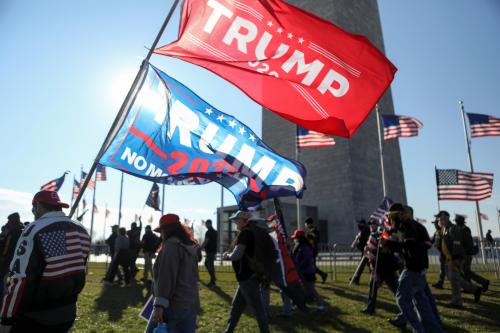As the Trump era comes to a close, many Americans will breathe a sigh of relief as the chaos, divisiveness and cloud of corruption that have characterized this presidency recede. In spite of Trump’s unprecedented attempts to undo democracy, by and large our institutions held. The courts did not overturn the election, the press has not been nationalized or silenced, and civil servants stood up to the president on issues from the infamous Ukraine telephone call to the approval timeline for Covid-19 vaccines. Nancy Pelosi and the Democratic House of Representatives were not cowed and their powers were not diminished. Even the craven Republican Senate showed, once in a while, that it would act contrary to Trump’s will—from the passage of a Russian sanctions bill at the beginning of the Trump era to the veto override of the defense bill at the end.
But a healthy democracy needs constant tending. It’s time to look at our entire democratic system and see where changes should be made. As I have argued before, reforming the primary system to re-insert some element of peer review into our nomination system would go a long way towards preventing people like Trump from getting a shot at the presidency in the first place. But that is only one of many areas where reform is needed.
Another area of concern is the legal constraints or lack thereof on the presidency. Here one should turn to Bob Bauer and Jack Goldsmith’s invaluable book, After Trump: Reconstructing the Presidency. The book is a comprehensive agenda for those who would like some means of preventing or coping with Trump-like presidents in the future. Bauer is one of Washington’s most famous election lawyers. He represented the Democratic National Committee and the Biden campaign, and served as White House Counsel in the Obama Administration. Goldsmith is a professor at Harvard Law School who played key roles in the second Bush Administration and is considered one of the best conservative legal minds in the country. Together they provide a very sensible roadmap for reform.
Many of the reforms they deal with are issues that have arisen in other presidencies but that were exacerbated by the Trump presidency. For instance, the presidential pardon process has come under scrutiny during the presidencies of George W. Bush and Bill Clinton. The special counsel process has been criticized and amended since it was first used during Watergate in the 1970s. And questions around the political context of FBI investigations go all the way back to the reign of J. Edgar Hoover (1935 to 1972.)
But perhaps the most interesting reform proposals are the ones that deal with issues unique to the presidency of Donald Trump. Never before in modern American history have we suspected a sitting president of acting in the interests of a foreign power. As Speaker Pelosi famously said in a White House meeting to Donald Trump “With you all roads lead to Putin.” The persistent suspicion that Russia has something on Donald Trump has hung over his presidency since it was revealed that Russia interfered in the 2016 election. Since there is no precedent, it is not surprising that the laws on the books have not been sufficient to deal with a president suspected of owing a great deal to any foreign power, much less an enemy, of the United States.
Thus, Bauer and Goldsmith propose a series of amendments to 22 U.S.C. Section 219 dealing with foreign state influence. Their amendments would include presidential candidates in the statutes and would require campaigns to report any contacts from foreign states offering campaign support or assistance. Chief among these is opposition research, which, they point out, can be much more damaging coming from a foreign state’s spying capacity than run-of-the-mill firms. “The aim,” they write, “is to ban any case where a presidential campaign and foreign nationals communicate in the service of their mutual goal of seeing the candidate elected” (p. 44).
A second area for reform is needed because, in the early days of the administration, Trump refused to divest himself of his assets. Instead, Trump’s lawyers fashioned a unique trust arrangement which was deemed so inadequate that it lead to the resignation of Walter Shaub, Jr., Director of the Office of Government Ethics. As soon became evident, Trump continued to have an active role in the management of his businesses. No one in Washington thought this was a good idea. In fact, by the last year of Trump’s term his active involvement in his businesses led Congress to include, in a section of the massive CARES Act, a provision explicitly forbidding the president and his children from participating in the loans and other business-related relief in the law. Bauer and Goldsmith conclude that this entire area of the law needs an overhaul. “Congress,” they write, “should bar the President from any active or supervisory role in the oversight of any business, including any formal or informal role” (p. 358). Their proposal would require the president report to Congress on all sources of income and it would prohibit the president from declining his or her salary.
Finally, Bauer and Goldsmith tackle the issue of Trump’s taxes. From the Carter Administration on, presidents released their returns. Trump refused to release his tax returns, making the specious argument that they were the subject of an audit. As his term wore on, various attempts to get his returns failed. The state of California went so far as to require candidates to release their returns in order to get on the general election ballot, but the court struck it down. Bauer and Goldsmith conclude that “absent a legal disclosure requirement applicable to all presidents and presidential candidates, the public cannot easily or expeditiously get access to a president’s records…” (p. 82). Thus, they propose an amendment to the Ethics in Government Act that would require all presidents and all presidential candidates to release their tax returns. They would extend this to all members of a president’s family holding official positions.
Hopefully this book will land on the desks of many members of the 117th Congress and some of these suggestions will turn into law. Of course, much of it is dependent upon the will of Congress to sanction the president. But Bauer and Goldsmith argue that the transparency alone would work better than the current system when it comes to letting us know what we have a right to know: What is the president up to and who does he owe?









Commentary
How can we prevent Trump-like presidents in the future?
January 6, 2021